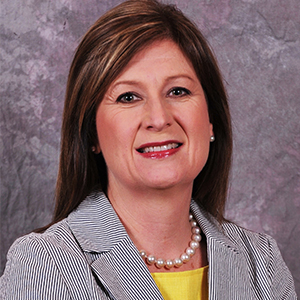
AN INTERVIEW WITH TAMMIE KEAR, PH.D., RN, CNN, FRESENIUS MEDICAL CARE NORTH AMERICA (FMCNA) NURSE AND PRESIDENT-ELECT OF THE AMERICAN NEPHROLOGY NURSES ASSOCIATION.
Q: As people live longer with end stage renal disease, we’re seeing an uptick in the number of patients who need dialysis, which increases demand for skilled nurses. With this trend, what kinds of opportunities will be available to nephrology nurses in the future?
TK: The opportunities for nephrology nurses today are certainly growing in the acute care setting, and I see opportunities really expanding in our community and in our home setting as well. When we speak about patients requiring dialysis, the opportunities are endless. While patient opportunities grow, so do opportunities for nurses who work in chronic kidney disease (CKD) clinics and transplant settings.
Q: Home dialysis options are gaining popularity among people living with kidney disease. Will this create new, different opportunities for nephrology nurses?
TK: Home dialysis provides opportunities for the nurses to be the coordinators in care, the patient educator and often the frontline individual who’s responsible for assisting that patient in delivering care for themselves at home. One of the things that we’re challenged with when caring for a patient with a chronic illness and disease is that they often feel a loss of control, but home therapies are a great way, with proper education and training, to put the freedom and flexibility back into the hands of the patient. The nurses are often the individual who gets to empower the patient with that knowledge, with the training, the skills and the support to help our patients succeed.
Q: What are the unique benefits of becoming a nephrology nurse over other nursing specialties?
TK: Nephrology nurses have quick and strong assessment skills, similar to a critical care nurse, while also needing to be able to coordinate care and transitions in care such as a nurse who works in a community setting. Additionally, successful nephrology nurses have strong interpersonal skills because we have the privilege of taking care of our patients for not just days, weeks or months, but often years and even decades. You develop very special relationships.
Q: Your own career spans opportunities as an educator, practitioner and researcher. Do you feel that other nurses should consider pursuing diverse careers within nephrology?
TK: I certainly would hope so, because nephrology is an area that we need to continue to expand research and particularly nursing research. Nephrology nursing lends itself nicely to being in each of those tracks or to picking a track and moving your career forward. As our patient population continues to expand and grow and even as the demographics of our population changes a little bit, these opportunities only continue to expand as well.
Q: What motivates you to continue practicing and seeing patients?
TK: It’s the patients, and it’s always been the patients. That’s why my research is focused on patient and nurse safety, because both are so intertwined. If the nurse is safe and healthy, then the patient can be safer and healthier and vice versa. That’s what drives me back to the bedside, that’s what drives the research and that’s why I’m out there trying to be on the forefront of nephrology nursing.
Q: Nephrology nurses spend up to 12 hours a week with each patient. They’re dedicated to excellent care, committed and passionate. How important is it to take time to appreciation these nurses?
TK: I’ve asked the question in my research “What was the greatest level of recognition that you’ve received?” Hands down it was the recognition from the patients. It was a little thank you letter; it was a hug; it was perhaps after a patient passed away and the family came back and said thank you for making my loved one’s life a little easier in the end and thank you for being there for us. It’s that patient appreciation that really makes a difference, and it’s also important that nurses receive ongoing words of encouragement from their employer, from their manager and from groups like the American Nephrology Nurses Association (ANNA).
Q: Speaking of the American Nephrology Nurses Association (ANNA), congratulations on your new role as president-elect. When you enter this new role in April 2019, what are your biggest goals?
TK: The focus of my year will be innovation in nephrology nursing because we will have celebrated our 50thanniversary. I’ll be bringing us into our 51st year. My focus is also on where we are going to go as a specialty moving forward and how we are going to get there. My role is really about empowerment for our nurses.
Q: This year as part of Nephrology Nurses Week, FMCNA nurses will be able to join ANNA at a reduced rate. Can you speak a bit about the partnership between FMCNA and ANNA and what that has meant for our nurses?
TK: The initiative to offset the cost of ANNA membership for FMCNA nurses is a tremendous benefit because it connects our nurses to a larger community of nephrology nurses. Not all nephrology nurses work in a dialysis clinic that has 10 other individuals. Membership also provides opportunities to become engaged, to educate themselves and to also be part of additional scholarships, research grants and more. The $4,000 scholarships are a tremendous benefit for individuals as well because the scholarships afford nurses an opportunity to further their education.
For more on the partnership between Fresenius Medical Care North America and the American Nephrology Nurses Association, visit our partnership page.


